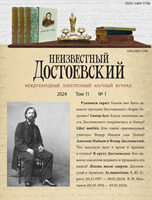Аполлон Майков и Федор Достоевский: неосуществленный замысел рассказов из русской истории
Apollon Maikov and Fyodor Dostoevsky: the Unfulfilled Idea of Short Stories from Russian History
Author(s): Olga Viktorovna Sedelnikova, Irina Svyatoslavovna AndrianovaSubject(s): Cultural history, Social history, Russian Literature, Sociology of Religion, Sociology of Literature
Published by: Петрозаводский государственный университет
Keywords: Apollon Maikov; Dostoevsky; stories; creative history; plan; idea; history of Russia; Orthodoxy; patriotism;
Summary/Abstract: The article examines the creative history of short stories from the Russian history of Apollon Maikov on the basis of epistolary sources and archival materials. The idea of the work emerged in the author’s mind in a discussion with Fyodor Dostoevsky: in letters of 1867–1869 they reflected on Russia’s past and future, the work on the translation of the “Tale about Igor’s Campaign,” the need to create a textbook living history, the central event of which would be the spread of Christianity in Russia. In correspondence with Maikov, Dostoevsky outlined the concept of epics as a literary genre capable of expressing the essence of Russian history and “serving to revive the self-consciousness of the Russian people” and delineated the turning points of history that determined the future of the country. Maikov conceived another version of the description of Russia’s past — a cycle of ten to twelve historical short stories “for children and the people.” He recorded the plan of the work point by point in papers dating from 1868, and outlined it to Dostoevsky in an April letter for 1869. In separate short stories, he intended to reveal the deeds of Alexander Nevsky, Metropolitans Peter and Alexy, Dmitry Donskoy, Ioann III, Ivan the Terrible, Ermak, St. Sergius of Radonezh, Peter I, Catherine II, Suvorov, the events of 1812, the Crimean War and the liberation of the peasants. The author planned to tell the reader about the main events of Russian history and the patriots of Russia, to reveal the supreme destiny of its historical path, the prerequisites for the formation of the Russian national character, to highlight the idea of unity and integrity of all Russian territories. To realize the idea, Maikov processed chronicle legends, epics, folklore sources (for example, anecdotes about Peter I), the works of historians (I. D. Belyaev, K. P. Pobedonostsev, etc.). He thought out the plots in detail, worked through them repeatedly (which is confirmed by the preserved cycle plans for 1868 and 1881), but released from print only two short stories in 1869 (the second story includes four separate plots). Neither Dostoevsky nor Maikov succeeded in carrying out their plans for historical works. But their plans testify to a common understanding of the historical path of Russia — the path of preserving the Orthodox Christian truth in the struggle for identity and independence. Conscious of their moral duty to the fatherland, they considered it their duty to convey to readers the need to feel Russian and the right to be proud of the history of this great country.
Journal: Неизвестный Достоевский
- Issue Year: 11/2024
- Issue No: 1
- Page Range: 127-153
- Page Count: 27
- Language: Russian

